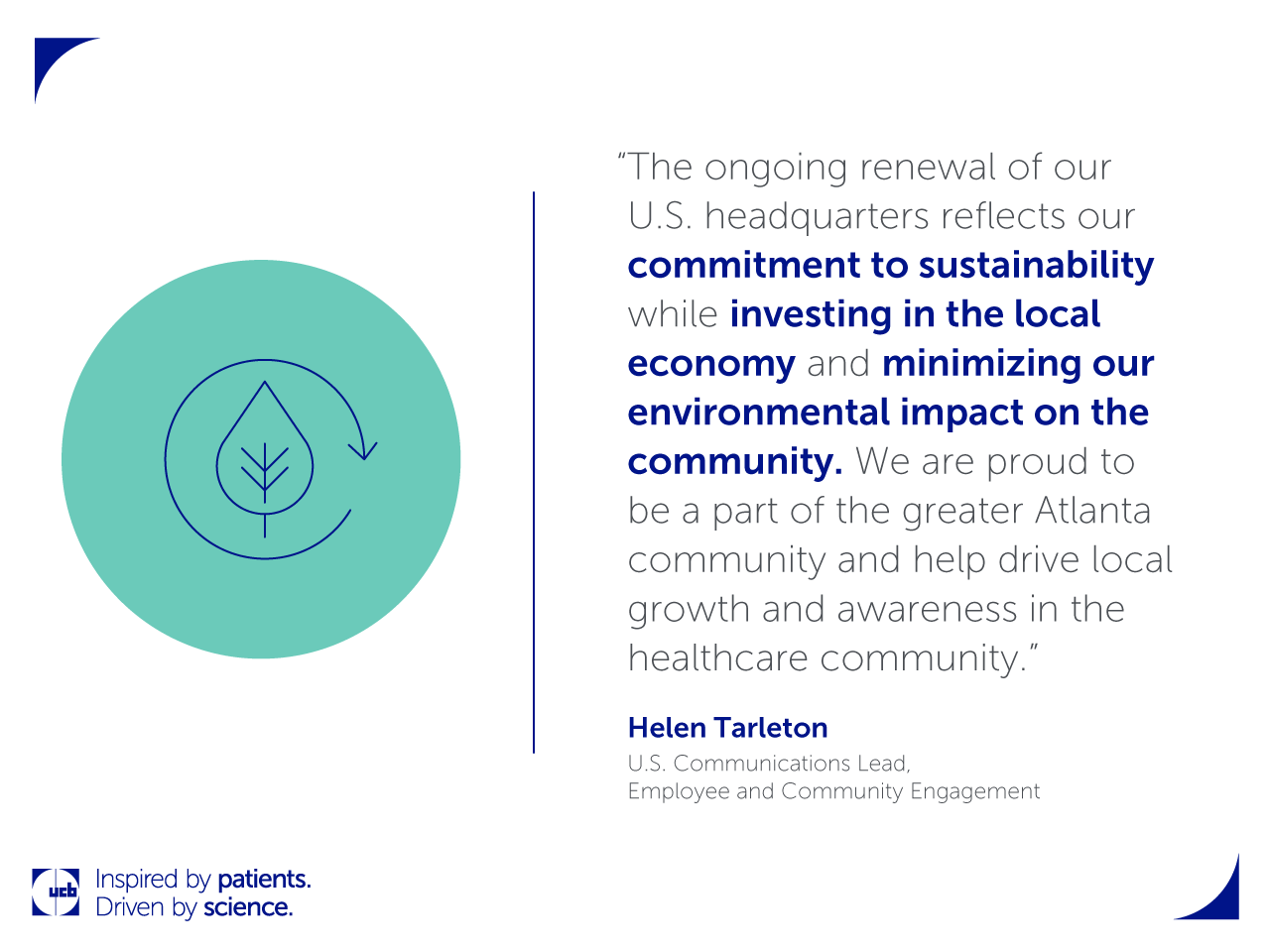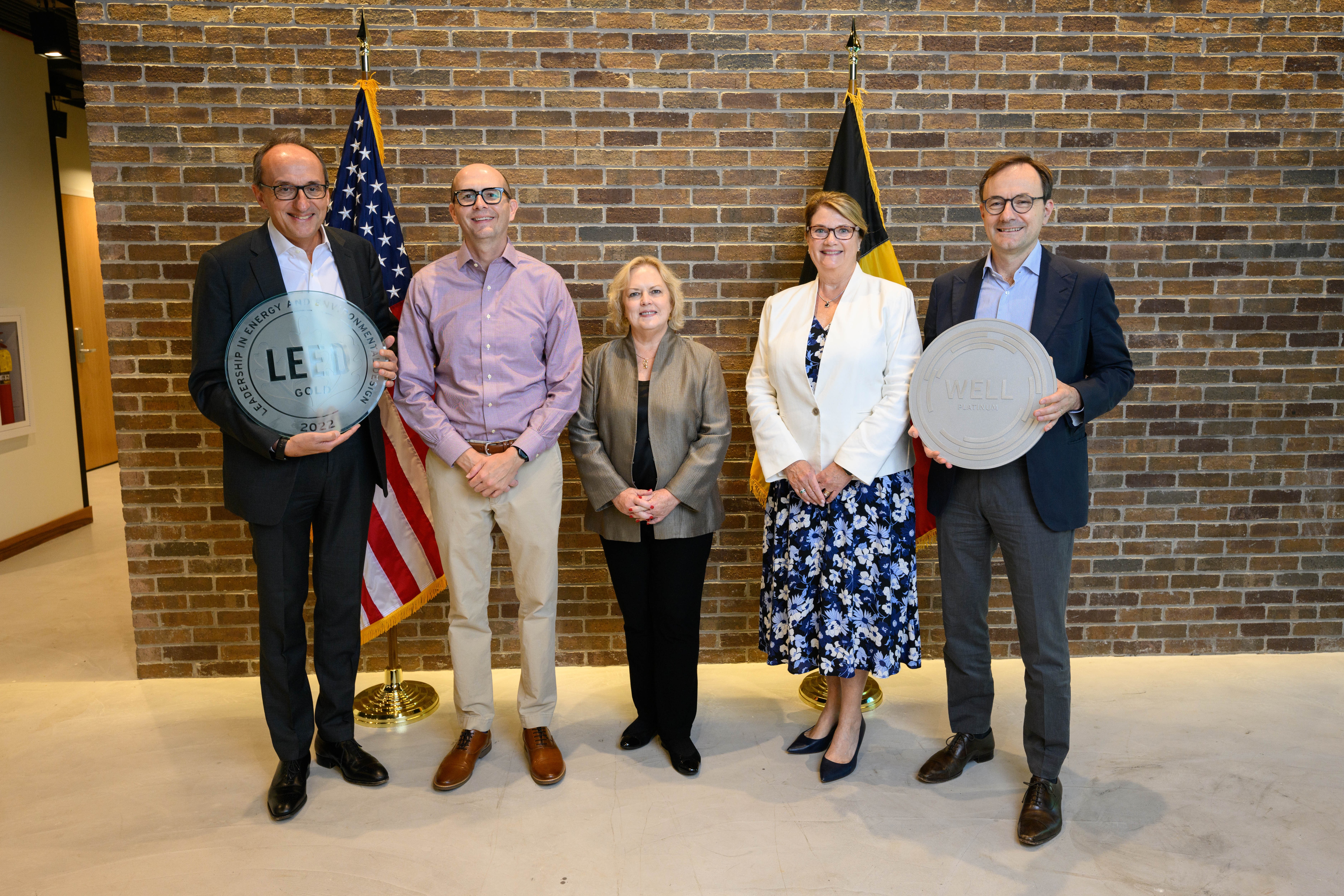
This Earth Day, we’re highlighting the ongoing renewal of our U.S. Atlanta headquarters, and the positive impact of this work on our employees, the people we serve, and the environment. This is one example of how we invest in our people and use sustainability to guide our business approach.
Our Atlanta campus, our recently built Warehouse, was awarded the prestigious LEED Gold and WELL Platinum certifications last fall. UCB’s investment in securing these certifications is proof of our corporate commitment to green building efforts and supporting our employees' health, safety, and well-being.
These certifications are the premier standards for green building and enhancing people’s health and well-being through building design. At the time of the certifications, the Atlanta Warehouse was the first dually certified WELL Platinum and LEED Gold pharmaceutical project worldwide and the first WELL Platinum project in Georgia.
Our Atlanta Warehouse earned the WELL Platinum distinction based on ten categories of building performance: Air, Water, Nourishment, Light, Movement, Thermal Comfort, Sound, Materials, Mind, and Community. The WELL Building Standard is a performance-based certification system that marries best practices in design and construction with evidence-based scientific research.
The LEED certification ensures electricity cost savings, lower carbon emissions, and healthier environments. In the U.S. alone, buildings account for almost 40 percent of national carbon dioxide (CO2) emissions, but LEED-certified buildings have 34 percent lower CO2 emissions, consume 25 percent less energy and 11 percent less water, and have diverted more than 80 million tons of waste from landfills.
The WELL certification is measured on an 80+ point scale which looks at air quality, access to fresh foods, noise suppression, natural light and other measures that impact the health of the people working in the building.

UCB is dedicated to improving technology and energy efficiency in its facilities.
Our ongoing Atlanta campus renovation starting with the Warehouse, has allowed us to embrace several new workplace initiatives to support the development of a greener UCB:
- Diverting more than 85 percent of Warehouse waste generated during construction – equating to more than 1,500 tons of waste and saving 60 loaded standard garbage trucks from the landfill.
- Reducing the Warehouse’s total energy consumption by 30 percent against the American Society of Heating, Refrigerating and Air-Condition Engineers (ASHRAE) 90.1-2010 baseline and without using any fossil fuel energy sources, in support of UCB’s commitment to reduce its overall Green House Gas (GHG) CO2 emissions by 35 percent by 2030.
- Offsetting approximately 20 percent of the buildings’ anticipated total annual energy use by installing a 223-kWh photovoltaic array (solar panels) for supplemental power generation located on the roof.
- Installing two 8,000-gallon cisterns to capture rainwater for landscape irrigation serving both the Warehouse project site and elsewhere on campus which is sufficient to serve 100 percent of the annual irrigation needs for the landscape served by this system.
Our Warehouse building is one step of many as we work toward a more sustainable model and reimagine how UCB employees can best work and collaborate with one another to better create and deliver value for people living with severe diseases. Read more about other UCB contributions to environmental sustainability here and our commitment to the Health of the Planet here.
Choose Country
- Global Site – English
- Australia – English
- België – Engels
- Belgique – Anglais
- Brasil – Português
- България – Български
- Canada – English
- Canada – Français
- 中国 – 中文
- Česká Republika – Angličtina
- Danmark – Engelsk
- Deutschland – Deutsch
- France – Français
- España – Español
- Ελλάδα – Ελληνικά
- India – English
- Ireland – English
- Italia – Inglese
- 日本 – 日本語
- Казахстан – ағылшын тілі
- 한국 – 한국어
- Luxembourg – Anglais
- Luxemburg – Engels
- Magyarország – Angol
- México & Latinoamérica – Español
- Nederland – Engels
- New Zeeland – English
- Norge – Engelsk
- Österreich – Deutsch
- Polska – Polski
- Portugal – Inglês
- România – Engleză
- Россия – Русский
- Slovensko – Anglický
- Suomi – Englanti
- Sverige – Engelska
- Schweiz – Deutsch
- Suisse – Français
- Türkiye – Türkçe
- Україна – Англійська
- United Kingdom – English
- U.S.A. – English


